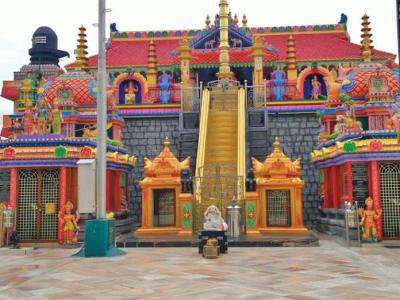- TOP
- 資料館
- FOCUS
- June 2019 - Volume 96
- Women's Right to Worship in Sabarimala Temple Upheld
FOCUS June 2019 Volume 96
Women's Right to Worship in Sabarimala Temple Upheld
The Supreme Court of India ruled in 2018 that the prohibition of women between the ages of ten and fifty from worshipping at the Sabarimala Temple, a famous pilgrim temple in the state of Kerala, was unconstitutional. The prohibition is provided in the 1965 Kerala Hindu Places of Public Worship (Authorisation of Entry) Rules. These rules implement the 1965 Kerala Hindu Places of Public Worship (Authorisation of Entry) Act.
The Sabarimala Temple is dedicated to the Hindu deity Sree Ayyappa, and worshippers are required to practice abstinence for forty-one days before entering the temple.
2006 Petition
In 2006, the Indian Young Lawyers Association and other parties filed a petition1 with the Supreme Court of India seeking to declare the rule (Rule 3[b] of the Kerala Hindu Places of Public Worship [Authorisation of Entry] Rules) prohibiting women from worshipping at the Sabarimala temple as unconstitutional. On 28 September 2018, the Supreme Court through the Chief Justice (Dipak Misra) and another Justice (A.M. Khanwilkar) ruled that
(iii) The exclusionary practice being followed at the Sabrimala temple by virtue of Rule 3(b) of the 1965 Rules violates the right of Hindu women to freely practise their religion and exhibit their devotion towards Lord Ayyappa. This denial denudes them of their right to worship. The right to practise religion under Article 25(1) is equally available to both men and women of all age groups professing the same religion.
After the ruling came out, several groups filed review petitions seeking its reversal.2 Many worshippers of the temple also protested the Supreme Court ruling.3
Sabarimala Temple4
Court Rationale
The Supreme Court decision discusses the question of equality in relation to practicing spiritual beliefs. It explains:
There is inequality on the path of approach to understand the divinity. The attribute of devotion to divinity cannot be subjected to the rigidity and stereotypes of gender. The dualism that persists in religion by glorifying and venerating women as goddesses on one hand and by imposing rigorous sanctions on the other hand in matters of devotion has to be abandoned. Such a dualistic approach and an entrenched mindset results in indignity to women and degradation of their status. The society has to undergo a perceptual shift from being the propagator of hegemonic patriarchal notions of demanding more exacting standards of purity and chastity solely from women to be the cultivator of equality where the woman is in no way considered frailer, lesser or inferior to man. The law and the society are bestowed with the Herculean task to act as levellers in this regard...
The court further states:
The subversion and repression of women under the garb of biological or physiological factors cannot be given the seal of legitimacy. Any rule based on discrimination or segregation of women pertaining to biological characteristics is not only unfounded, indefensible and implausible but can also never pass the muster of constitutionality.
This view addresses the stance of the Kerala government and temple worshippers on the supposed unclean condition of women who are menstruating, and thus girls and women from age ten to fifty are not allowed to enter the temple and its precincts.
In this light, the court states:
(vi) The notions of public order, morality and health cannot be used as colourable device to restrict the freedom to freely practise religion and discriminate against women of the age group of 10 to 50 years by denying them their legal right to enter and offer their prayers at the Sabarimala temple.
(xii) The language of both the provisions, that is, Section 3 and the proviso to Section 4(1) of the 1965 Act clearly indicate that custom and usage must make space to the rights of all sections and classes of Hindus to offer prayers at places of public worship. Any interpretation to the contrary would annihilate the purpose of the 1965 Act and incrementally impair the fundamental right to practise religion guaranteed under Article 25(1). Therefore, we hold that Rule 3(b) of the 1965 Rules is ultra vires the 1965 Act.
Current Situation
The Supreme Court of India has not yet acted on the petitions for review filed by several groups to overturn its ruling on the issue. And the Kerala government’s tourism promotion of the Sabarimala temple maintains the prohibition. One website accessed on 14 June 2019 has the following statement:5
People of all castes and creeds are permitted into the temple. However, entry is not allowed to women between 10 and 50 years of age.
A final Supreme Court decision affirming the right of all women to enter the Sabarimala temple can lead to a review of other religious practices in India that discriminate against women.
Endnotes
1 Indian Young Lawyers Association & Ors. v. The State of Kerala & Ors., Supreme Court of India, Writ Petition (Civil) No. 373 of 2006.
2 Satya Prasoon, “Review Petitions in Sabarimala,” Supreme Court Observer, 17 October 2018,http://scobserver.clpr.org.in/beyond-the-court/review-petitions-in-sabarimala.
3 BBC News, “Sabarimala: The Indian god who bars women from his temple,” 19 October 2018, https://www.bbc.com/news/world-asia-india-45901014.
4 Photo from Times Headline, “51 Women Below 50 Have Entered Sabarimala, Kerala Tells Supreme Court,” www.timesheadline.com/india/kerala/51-women-below-50-have-entered-sabarimala-kerala-tells-supreme-court-28520.html.
5 See Kerala Tourism, www.keralatourism.org/destination/sabarimala-temple/47.

